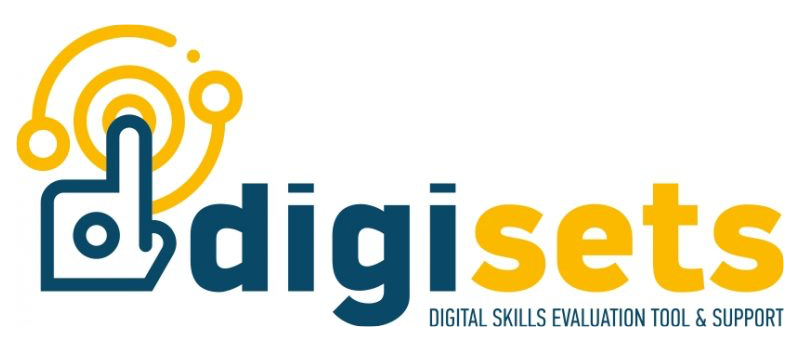DIGITAL SKILLS EVALUATION TOOL AND SUPPORT
Digital skills and abilities to work in digital and networked environments are one of the key competencies of integration in the 21st century labour market. Challenges and changes related to “Work 4.0” have touched all sectors of the economy, even in services industries like tourism and retail. Employees with rather low-skill assignments need to have digital abilities and understanding in order to be able to work efficiently. In short, there is a trend in services towards digitization and the necessity to have multi-disciplinary digital qualifications.
The EU has recognized this trend, and has developed a “Digital Competence Framework” to map out different dimensions and levels of digital skills that are relevant for work and private life. In Austria, the Ministry for Digitalisation and Economy has adapted the framework in order to include more dimensions and aspects of digital literacy in everyday life, and the Public Employment Service has a working group on new skills that concludes a great and rising demand and skill needs in all economic sectors, including tourism and retail.
Therefore, the digital education becomes a central element in any discussion on the topic. The demand of digital skills has risen and many jobseekers lack the skills to make a transition towards a digital work environment. Furthermore, there is a lack of accessible/transparent tools for organisations and stakeholders to measure and improve existing digital skills.
Objective
The DIGISETS project tackles a growing mismatch between existing digital skill levels and needed skill profiles, even in previously not highly digitalised work environments. Experienced organisations and training providers from AT, BG, ES, EL cooperate to reach the following objectives: First, to draw a map/framework of work-relevant digital skills (previous research and data). Second, to design an evaluation toolkit for organisations. The tool is multi-dimensional and gives a wider view of hard and soft digital skills in an accessible form. Mainly the toolkit will be designed for education professionals working with (prospective) employees in tourism and retail sector. The toolkit is produced and programmed together in English, and then translated into the partner languages.
The project will also implement a workshop for trainers from participant organisations. The goal is to present outputs (framework, toolkit, guidebook) for practical testing, feedback and critical exchange on the importance of digital skill sets and how to improve them. It will also provide a forum for networking, matching, discussion and testing. Preparation is done by online questionnaires, and further discussion/feedback will take place at the event. This will include practical exercises, feedback and guidance to training offers. Furthermore, the project will organise multiplier events in all participating countries to present results and learnings to other stakeholders, in order to promote and disseminate knowledge.
Besides management, communication and dissemination the following activities will take place: an analysis/mapping of existing digital skills studies to create a common framework (IO1), which will lead to the development of the digital skill evaluation toolkit (IO2), and the design of a set of trainer guidelines (IO3) how to use the tools. The tool is based on an open, modular technical platform and shows current skill level by using interactive scenarios, where participants are confronted with different situations and are required to apply their knowledge to solve issues.
The methodology used will be a logframe approach, as well as using SMART method with objectives and indicators. The project impact is the further development of participants in term of their ability to measure and improve digital skills. Also, project partners will use the tool for their own daily testing and guidance work and also promote it as good practice example.
In the long-term, the project shows that investing in the further development, especially digital skills of employees, is of utmost importance if one wants to successfully transit towards the digital workplace and embrace the challenges and potentials of I 4.0 as related to sectors like tourism and retail. Furthermore, in the interest of sustainability, the tools developed within DIGISETS will be presented on the Erasmus+ results platform and made available to stakeholders in the EU, which will enable future projects to build on the provided knowledge.

Programme: Erasmus+
Key Action: Cooperation for innovation and the exchange of good practices
Action Type: Strategic Partnerships for vocational education and training
Project Reference: 2020-1-AT01-KA202-078055
EU Grant: 237.974 EUR
Implementation Period: 01.10.2020 – 28.02.2023 (Extended)
digisets Evaluation Tool at https://digisets-project.eu/
Latest News
- Newsletter #04
 View our final newsletter reporting about the project meeting in Bulgaria, the Training Workshop in Vienna and our final result: The Guidebook for Trainers.
View our final newsletter reporting about the project meeting in Bulgaria, the Training Workshop in Vienna and our final result: The Guidebook for Trainers. - Final TPM in Vienna, February 2023
 Project partners from DIGISETS met in Vienna on February 16-17, 2023 in order to facilitate the fifth and final TPM meeting in the course of the DIGISETS project.
Project partners from DIGISETS met in Vienna on February 16-17, 2023 in order to facilitate the fifth and final TPM meeting in the course of the DIGISETS project. - Practical Testing of Project Tools
 Participants of ipcenters VET and guidance courses have already tested the evaluation tool, as part of their learning activities.
Participants of ipcenters VET and guidance courses have already tested the evaluation tool, as part of their learning activities. - Trainer Workshop in Vienna
 In January 2023 ipcenter hosted the DIGISETS training workshop. Trainers/counsellors from Austria, Greece, and Bulgaria participated and reviewed the project results (competence framework, evaluation tool, handbook). It was a great opportunity to gather practical feedback, suggestions for improvements, and potential further use cases for the DIGISETS evaluation tool.
In January 2023 ipcenter hosted the DIGISETS training workshop. Trainers/counsellors from Austria, Greece, and Bulgaria participated and reviewed the project results (competence framework, evaluation tool, handbook). It was a great opportunity to gather practical feedback, suggestions for improvements, and potential further use cases for the DIGISETS evaluation tool.
Project Consortium

ipcenter.at
Coordinating Partner • Austria

fit4internet
Austria

Euro Consulting
Bulgaria

Best Cybernetics
Greece

I BOX CREATE
Spain
